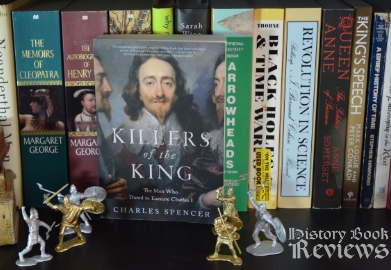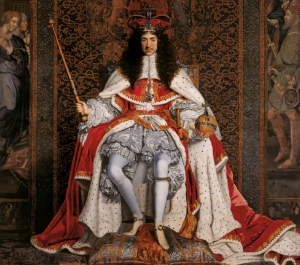Killers of the King: The Men Who Dared to Execute Charles I
by Charles Spencer

Review
In 1649 something completely unprecedented happened in England: The King was murdered. Not just murdered in a dark castle chamber by members of his own family who wanted him out of the way. That actually happened quite a lot. What made 1649 so extraordinary is that the King was murdered by vote and decree of Parliament; by the people of England themselves, his own subjects. And as his severed head tumbled toward the edge of the scaffold and his consciousness fled from his still body, the assembled crowd rushed forward to dip their handkerchiefs in his flowing blood, sure that they had witnessed something utterly unique. Nobody knew exactly what the future would bring but, as Spencer illustrates in Killers of the King, one thing was inevitable: King Charles would be avenged.
This book is, at its core, an account of the bloody revenge meted out to all Parliamentarians involved in the execution of Charles I. After Charles I's death, England was briefly ruled by a republic before the monarchy was restored by the dead king's son, Charles II. In Killers of the King, Charles Spencer (the author and, confusingly, the third Charles in this review) delightfully reveals an intense personality trait of the young new king: when it came to bloodthirstiness and revenge, the Count of Monte Cristo had nothing on Charles II! Spencer discusses in detail Charles' life-long quest for revenge against those who had a hand in his father's death. This was a part of history I knew nothing about prior to reading Killers of the King, and it was epic and exciting the whole way through.
While Spencer does give an overview of the English Civil War and Charles I's trial and execution, this is by no means the focus of the book and Charles is already dead by the end of the second chapter. However, even knowing little about the background, I didn't miss it. Spencer's vivid and conversational discussion about the individuals involved was riveting, and I think he succeeded wildly in presenting a historical account of these events through a very specific lens. In fact, I'd even venture to say that I can't imagine this story of treachery, bloodshed and calculated revenge could possibly be told in a more delightful, respectful, and warmhearted way. I won't say he makes torture and disemboweling enjoyable, per se, but he...ok, yeah, actually, he makes it pretty enjoyable.

King Charles II: Regal, bloodthirsty, and fairly unfortunate looking.
Charles II, that sneaky devil, wanted blood. When he first retook the throne he urged all the Parliamentarians who had a hand in his father's death to come forward, told them they wouldn't be punished. When a few did, he condemned them to death. Then he announced that he only needed to make an example of a handful of men, but that all others would be pardoned. I'm surprised his pants didn't catch on fire. For the men who killed his father, each and every one, only the Traitor's Death would do. This was a form of execution so gruesome and horrific it was only reserved for big-time treason, and even then was often commuted to a simple beheading. The unlucky few condemned to a Traitor's Death were drawn by horse and cart (sometimes in the cart, sometimes dragging behind it) to the place of execution. They were hung by the neck until nearly dead, then cut down and revived so they were conscious for the rest. Their genitals were cut off (I mean for god's sake, just stop there--that's so rude), then their stomachs were slit open and all their organs removed and thrown onto a fire, so the person would actually see and smell their own innards and manhood burning while they were still alive. Then they were finally beheaded, and their body chopped into four quarters. The pieces were distributed across the city as a warning to deter others from committing treason, and would slowly rot in the sun for all to witness. Aside from this lovely pastime, the King also enjoyed music, cards, and the theater.
There were so many people involved in Charles I's death, whether through his trial, the signing of his death warrant, or even through outspoken support of Parliament, so Killers of the King by necessity has only short biographical snippets on each. As a result, the book is fast-paced and varied, giving a comprehensive overview of the revenge campaign as a whole while still highlighting individual men (and sometimes women) and their fates. Whether by punching their executioners in the face while their innards were being burned in front of them, sword fighting with brooms and cheese wheels in place of swords and shields, or living in caves for years being pursued by mountain lions, these men displayed their resistance and their belief that they had done nothing wrong in putting the King to death. They fled and lived lives on the run, both on the continent and even in the new colonies of America, living in fear and making daring escapes for the rest of their lives, as Charles II's men hunted them ceaselessly for decades.
Spencer navigates the dark themes of execution, implacable hatred, and justifiable rights with grace, humor, and sensitivity. He was so neutral and fair to all parties that it took me until the end of the book to get an idea which side of the conflict he supported. His neutrality is all the more impressive because his family has very close ties to the monarchy, and he could easily have very strong feelings on the subject that bled (sorry/not sorry for the pun) into his writing. Instead, he was thoughtful and exploratory, bringing honor to both the Parliamentarians and the murdered King. He makes Traitor's deaths and fugitive living entertaining and fun, while keeping the gravity of the conflict quite intact.
More intact than most heads in the story.



